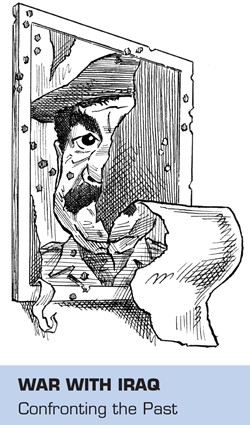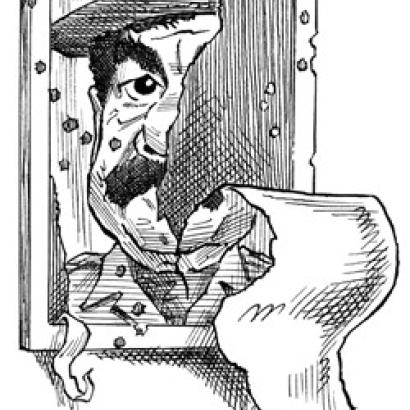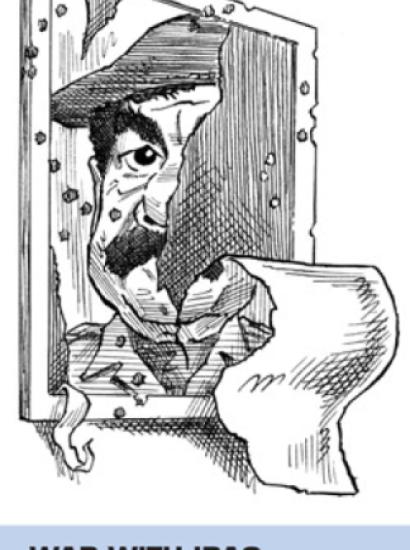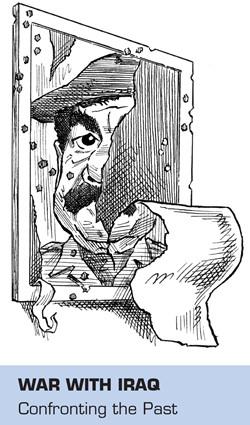- International Affairs
- US Foreign Policy
- Security & Defense
- US Defense

Now that the giant statue of Saddam has been toppled in Baghdad, we face the challenge of how to deal with Iraq’s whole Saddamned past. A good starting point is to ask yourself this question: What would I have done with “Chemical Ali” if he’d been caught alive in Basra? Here’s a man who in 1988 led a campaign that killed an estimated 100,000 Kurds, mostly civilians, and gassed 5,000 in Halabja. Ali Hassan al-Majid was a mass murderer in the same class as General Ratko Mladic of the Bosnian Serbs.
I know where I would have sent him: straight to a cell in the Hague, down the corridor from Slobodan Milosevic. That’s where the Iraqi war criminals we do now capture should go, and that’s where Saddam Hussein should go in the unlikely event of us catching him alive. The International Criminal Court covers only crimes committed since 2002, but it would be entirely feasible for the United Nations to authorize a special tribunal for war crimes and crimes against humanity in Iraq, as it has for the former Yugoslavia.
Instead, the United States is saying that Iraqi war criminals will be tried under American law. There’s always the suspicion among the defeated in a war that any subsequent trials are “victors’ justice.” Nothing could be better calculated to confirm that view than this crass proposal. I hope and trust that the British government will insist on a U.N.-sanctioned international tribunal for Iraq and will hand over the suspected war criminals that British forces capture only to such a legitimate international court.
What, you might add, about any possible crimes committed during this war on Iraq by American and British soldiers? Again, my answer as a liberal internationalist is clear: They should be subject to the International Criminal Court, under exactly the same rules, standards of proof, and sentencing as everyone else. At the moment, of course, British soldiers are but American ones are not.
This question of what to do with liberated-occupied Iraq’s war criminals is just one aspect of dealing with the country’s vicious past. That, in turn, is part of the even larger issue of how we convert the still smoldering ruins of Basra and Baghdad into the capitals of a self-governing democratic Iraq. There is now a large range of experience to draw on, from Kosovo to East Timor and Afghanistan, about how to transform an economy, write a new constitution, and foster independent media and civil society.
Here is, so to speak, the world toolbox of transition. The U.S. State Department, the Pentagon, and the British Foreign Office are all rummaging around in that toolbox. The State Department, for example, has a Future of Iraq Project, in which it discusses with selected Iraqi exiles what to do about the economy, education, civil society—and the difficult past.
Coming to terms with or overcoming a dictatorial past—what I call “past-beating”—is a vital part of the whole transition business. We now have precedents from more than 30 countries as diverse as South Africa, Chile, Serbia, and Germany after both nazism and communism. Past-beating comes in three forms: trials, purges, and history lessons.
Trials should, usually, be confined to the very worst category of human rights violations and war crimes. They should be conducted by a neutral international court applying international humanitarian law that was in force at the time the crimes were committed. Otherwise you violate a principle of justice by making it retrospective. If you use your own national laws, or make up new ones to fit the occasion, this, to the defeated, does not look like justice at all.
Both objections were made to the Nuremberg trials of Nazi leaders after World War II. If you try to use local courts and laws in the country concerned, as the Americans are proposing to do for the smaller fry in Iraq, you get into all the contortions of trying to stretch existing criminal laws to fit dictatorial abuses, as happened in the trial of the East German communist leader Erich Honecker.
Anyway, there are so many lesser crimes and criminals in such regimes, you can’t begin to try them all. To try just some of them violates another important principle: equality before the law. This will look especially bad because the occupying regime will assuredly be employing other minor criminals in the necessary work of reconstruction. In Basra, for example, the British are proposing to restore law and order through the services of a friendly sheikh, local tribal representatives, and elements of the existing police—some of them doubtless with blood under their fingernails.
Yet crimes against humanity should never be amnestied or ignored. It is, to me, a source of continuing amazement and deep satisfaction that some of the worst political criminals of the wars of the Yugoslav succession are now behind bars in the Hague. It would be good to see a few Iraqis join them.
Purges are a necessary evil. If you employ deeply compromised senior members of the former regime in your own administrative apparatus, they may go on acting in a corrupt, undemocratic, or otherwise undesirable way. Even if they don’t, their mere presence will compromise the new regime in the eyes of many—especially the more idealistic young.
That’s what happened when the students of 1968 contemplated the former Nazis employed in high places in post-war West Germany. That’s the risk if we now engage too many prominent former Saddamites. However, we shouldn’t try to vet every postman or clerk, nor can we possibly exclude all the 1.5 million former Baath Party members. The vetting should be done fast and firmly but confined to the most senior, visible, or influential positions in public life. That’s a pragmatic rough-and-ready rule, but purges are arbitrary anyway.
In the long run, the most fruitful form of past-beating is what I call “history lessons,” by which I mean everything from the individual citizen having the right to read his or her secret police file, through the opening up of the archives for scholars and journalists, to a full-blown truth commission, as seen in Chile and South Africa. These methods encourage the psychological confrontation of a society with its dictatorial past in all its complexities. You discover, for example, that servants of the regime can also be its victims and that victims in one context are victimizers in another.
Everything depends on when, how, and by whom these things are done. Ideally, they should be done fast, scrupulously, and by the people of the country itself, not outsiders. These three desiderata are especially difficult to combine in an occupied, collapsed, fractured state such as Iraq. You might, for example, get a fast, efficient sifting of the Iraqi secret police files if you gave the job to a former head of the CIA, but would this ever be accepted by the locals? Or, to take another example, will Al Jazeera be given the same access to the archives as CNN? And who would sit on an Iraqi truth commission? Would Kurd sit in moral judgment on Sunni, Shia on Kurd, exiles on those who stayed and suffered?
Saddam’s regime has fallen. Compared to getting the water supply running again, past-beating might seem a luxury. It’s not. Dealing rightly with the past is more important even than water for the long-term health of a future Iraqi democracy.
















